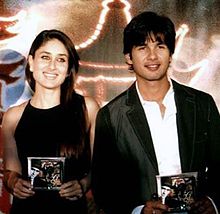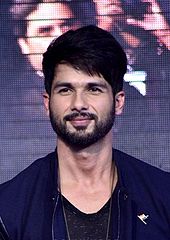Shahid Kapoor
Kapoor earned praise for playing a troubled businessman in Imtiaz Ali's romantic comedy Jab We Met (2007) and twin brothers in Vishal Bhardwaj's action film Kaminey (2009).
In addition to acting, Kapoor supports charities, hosts award ceremonies, and has featured as a talent judge on the dance reality show Jhalak Dikhhla Jaa Reloaded (2015).
[3] His parents divorced when he was three years old; his father shifted to Mumbai (and married the actress Supriya Pathak) and Kapoor continued living in Delhi with his mother and maternal grandparents.
[4][5] His grandparents were journalists for the Soviet magazine Sputnik, mostly translating works from Urdu into Russian, and Kapoor was particularly fond of his grandfather: "He would walk me to school every single day.
[10] During this time, Kapoor accompanied a friend to an audition for a Pepsi commercial featuring the stars Shah Rukh Khan, Kajol and Rani Mukerji, but wound up with the part himself.
[4] He appeared in television commercials for the brands Kit Kat and Close-Up, among others, and featured in music videos for several performers, including the band Aryans and the singer Kumar Sanu.
[11] Ishq Vishk tells the story of Rajiv Mathur (Kapoor), a high-school student who engages in a romantic affair with two classmates of contrasting personalities (played by Amrita Rao and Shenaz Treasurywala).
"[18] Later that year, Kapoor appeared in the romantic comedy Dil Maange More in which he was paired opposite three women: Soha Ali Khan, Tulip Joshi, and Ayesha Takia.
[22] The former was plagiarised from the Hollywood film There's Something About Mary in which Kapoor played one of Rimi Sen's love interests; the critic Khalid Mohamed found Kapoor to be "the only likeable element in this travesty" but Namrata Joshi of Outlook labelled him "colourless" and criticised his pairing with Sen.[23][24] His final role was that of a righteous teenager drawn towards a life of indulgence in John Matthew Matthan's drama Shikhar, co-starring Ajay Devgan, Bipasha Basu and Amrita Rao.
[27] Greater success came to Kapoor later that year when he starred alongside Amrita Rao in Sooraj Barjatya's romantic drama Vivah, a film depicting an arranged marriage.
[17] After featuring opposite Vidya Balan in the romantic comedy Kismat Konnection (2008), Kapoor played twin brothers, one with a lisp and the other with a stutter, in Vishal Bhardwaj's critically acclaimed action film Kaminey (2009).
[37][38] Writing for Variety, critic Joe Leydon reviewed that Kapoor "impressively displays sufficiently variegated degrees of emotional intensity to sustain the illusion of two distinct characters.
[29] Kapoor's final release of 2009 was as a cricketer in the Yash Raj Films production Dil Bole Hadippa!, a romantic comedy co-starring Rani Mukerji.
[43] He had a supporting role in Paathshaala, a drama about the education system in India, starring Nana Patekar,[44] following which he reunited with Yash Raj Films on the comedy-drama Badmaash Company, which follows a group of overambitious youngsters who become con men.
[66][67] Sanjukta Sharma of Mint found the film to be an "immensely effective reimagination of Shakespeare" and particularly praised Kapoor for playing his part with "impressive zest and inventiveness".
[68] Writing for Hindustan Times, critic Anupama Chopra wrote that Kapoor initially seemed uncomfortable in the complex central role, but added that he "slowly [...] comes to inhabit Haider, veering from rage to jealousy to madness in a heartbeat.
[70][71][72] After completing the duties of a talent judge on the dance reality show Jhalak Dikhhla Jaa Reloaded,[73] Kapoor appeared opposite Alia Bhatt in Vikas Bahl's Shaandaar (2015).
[77] After the producers filed a lawsuit against the board, the Bombay High Court cleared it for exhibition with a single scene cut, in which Kapoor's character is shown urinating on people.
[78] Sukanya Verma took note of the film's anti-drug message; she considered Kapoor to be "spectacularly unbridled" in his part and added that "the believability he brings to his complex transition while preserving his inherent flakiness deserves all the praise".
[96] Writing for The Indian Express, Shubhra Gupta criticised the film's misogynistic themes and found Kapoor to be "too old for this role, and his dissolution never feels as sharply realized as the one he managed so superbly in Udta Punjab".
[97] Even so, it earned over ₹3.7 billion (US$43 million) worldwide to emerge as the second highest-grossing Hindi film of the year and Kapoor's biggest commercial success in which he played the sole male lead.
Scroll.in's Nandini Ramnath found Kapoor to be in "fine form despite looking too old for the part", adding that he "reins in his tendency for self-pitying bombast to deliver a performance that complements Sunny’s vanity for equating counterfeiting with art".
[113][114] Keen to do a light-hearted role after a series of intense parts, Kapoor signed on to the romantic comedy Teri Baaton Mein Aisa Uljha Jiya (2024), in which he starred as a man who falls in love with a humanoid robot (played by Kriti Sanon).
[118] Commentators noted similarities between his roles in Deva and Kabir Singh, including Firstpost's Vinamra Mathur, who wrote that despite an "earnest" performance, Kapoor had overplayed his character's hypermasculinity.
In 2010, he took part in a charity event named Superstars Ka Jalwa, which helped generate money for the employees of the Cine and Television Artists Association (CINTAA).
"[153] Analysing his career, the entertainment portal Bollywood Hungama published that his "boy next door persona" was initially perceived by critics as a weakness, but credited him for turning it into a trademark.
[22] Jitesh Pillai of Filmfare wrote that after gaining recognition in urban romantic roles, Kapoor defied typecasting by taking on diverse parts in crime dramas and action films.
[155] Following the success of Jab We Met (2007) and Kaminey (2009), Kapoor's career went through a decline; he described the phase as a series of "wrong choices" and said that taking on a challenging role in Haider (2014) helped him reinvent himself.
[157] In her book Power of a Common Man, the author Koral Dasgupta writes that Kapoor does not "[conform] to any fixed rules of the trade", and notes that despite having a lopsided success ratio at the box office, he remains popular among the audiences.
[159][160] Considered one of the most attractive male celebrities in India,[161] he regularly features in the British magazine Eastern Eye's listing of the "50 Sexiest Asian Men in the World".







